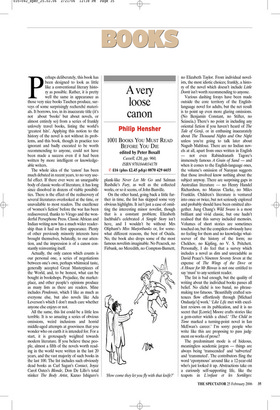A very loose canon
Philip Hensher
1001 BOOKS YOU MUST READ BEFORE YOU DIE edited by Peter Boxall Cassell, £20, pp. 960, ISBN 9781844034178 ✆ £16 (plus £2.45 p&p) 0870 429 6655 Perhaps deliberately, this book has been designed to look as little like a conventional literary history as possible. Rather, it is pretty well the same in appearance as those very nice books Taschen produce, surveys of some surprisingly recherché materials. It borrows, too, in its inaccurate title (it’s not about ‘books’ but about novels, or almost entirely so) from a series of frankly unlovely travel books, listing the world’s ‘greatest hits’. Applying this notion to the history of the novel is not without its problems, and this book, though in practice too ignorant and badly executed to be worth recommending to anyone, could not have been made a success even if it had been written by more intelligent or knowledgeable writers.
The whole idea of the ‘canon’ has been much debated in recent years, to no very useful effect. If there ever were an unarguable body of classic works of literature, it has long since dissolved in dozens of viable possibilities. There is the effect of the rediscovery of several literatures overlooked at the time, or unavailable to most readers. The excellence of ‘women’s fiction’ before the war has been rediscovered, thanks to Virago and the wonderful Persephone Press. Classic African and Indian writing now has a much wider readership than it had on first appearance. Plenty of other previously minority interests have brought themselves, belatedly, to our attention, and the impression is of a canon constantly reinventing itself.
Actually, the only canon which counts is our personal one, a series of negotiations between one’s own, perhaps whimsical taste, generally accepted Great Masterpieces of the World, and, to be honest, what can be bought in bookshops. Prejudice, the marketplace, and other people’s opinions produce as many lists as there are readers. Mine includes Pendennis, which I like as much as everyone else, but also novels like Ada Leverson’s which I don’t much care whether anyone else enjoys or not.
All the same, this list could be a little less terrible. It is so amazing a series of obvious omissions, weird inclusions and horrid middle-aged attempts at grooviness that you wonder who on earth it is intended for. For a start, it is grotesquely weighted towards modern literature. If you believe these people, almost a fifth of the novels worth reading in the world were written in the last 20 years, and the vast majority of such books in the last 100. The list includes such obviously dead books as Carl Sagan’s Contact, Joyce Carol Oates’s Blonde, Don De Lillo’s total stinker The Body Artist, Kazuo Ishiguro’s plank-like Never Let Me Go and Salman Rushdie’s Fury, as well as the collected works, or so it seems, of John Banville.
On the other hand, going back a little further in time, the list has skipped some very obvious highlights. It isn’t just a case of omitting the interesting minor novelist, though that is a constant problem; Elizabeth Inchbald’s celebrated A Simple Story isn’t here, and I wouldn’t be without Mrs Oliphant’s Miss Marjoribanks or, for somewhat different reasons, the best of Ouida. No, the book also drops some of the most famous novelists imaginable. No Peacock, no Firbank, no Meredith, no Compton-Burnett, no Elizabeth Taylor. From individual novelists, the most idiotic choices; frankly, a history of the novel which doesn’t include Little Dorrit isn’t worth recommending to anyone.
Various dashing forays have been made outside the core territory of the Englishlanguage novel for adults, but the net result is to point up even more glaring omissions. (No Benjamin Constant, no Stifter, no Sciascia.) There’s no point in including any oriental fiction if you haven’t heard of The Tale of Genji, or in enthusing inaccurately about The Thousand Nights and One Night unless you’re going to talk later about Naguib Mahfouz. There are no Indian novels at all, apart from ones written in English — not even Rabindranath Tagore’s immensely famous A Grain of Sand — and when it comes to the English-language ones, the volume’s omission of Narayan suggests that those involved know nothing about the subject anyway. There are surprising gaps in Australian literature — no Henry Handel Richardson, no Marcus Clarke, no Miles Franklin. Children’s literature is ventured into once or twice, but not seriously explored and probably should have been omitted altogether. Jung Chang’s Wild Swans is a most brilliant and vivid classic, but one hadn’t realised that this survey included memoirs. Volumes of short stories are sometimes touched on, but the compilers obviously have no feeling for them and no knowledge whatsoever of the history of the form; no Chekhov, no Kipling, no V. S. Pritchett. Personally, I do feel that a survey which includes a novel as dim and unreadable as David Peace’s Nineteen Seventy Seven at the expense of The Wings of the Dove or A House for Mr Biswas is not one entitled to say ‘must’ to any sentient reader.
The list is bad enough, but the quality of writing about the individual books passes all belief. No cliché is too banal, no phrasemaking too fatuous. ‘Beautifully crafted sentences flow effortlessly through [Michael Ondaatje’s] work.’ ‘Like Life met with excellent reviews on its publication, and it is no secret that [Lorrie] Moore crafts stories like a gem-cutter wields a chisel.’ ‘The Child in Time marked a turning-point novel in Ian McEwan’s career.’ I’m sorry: people who write like this are proposing to pass judgment on works of prose?
The predominant mode is of hideous, meaningless academic jargon — things are always being ‘transcended’ and ‘subverted’ and ‘transmuted’. The contributors fling the word ‘eponymous’ around like a 12-year-old who’s just looked it up. Abstractions take on a curiously self-supporting life, like the teapots in L’enfant et les Sortilèges:


































































 Previous page
Previous page